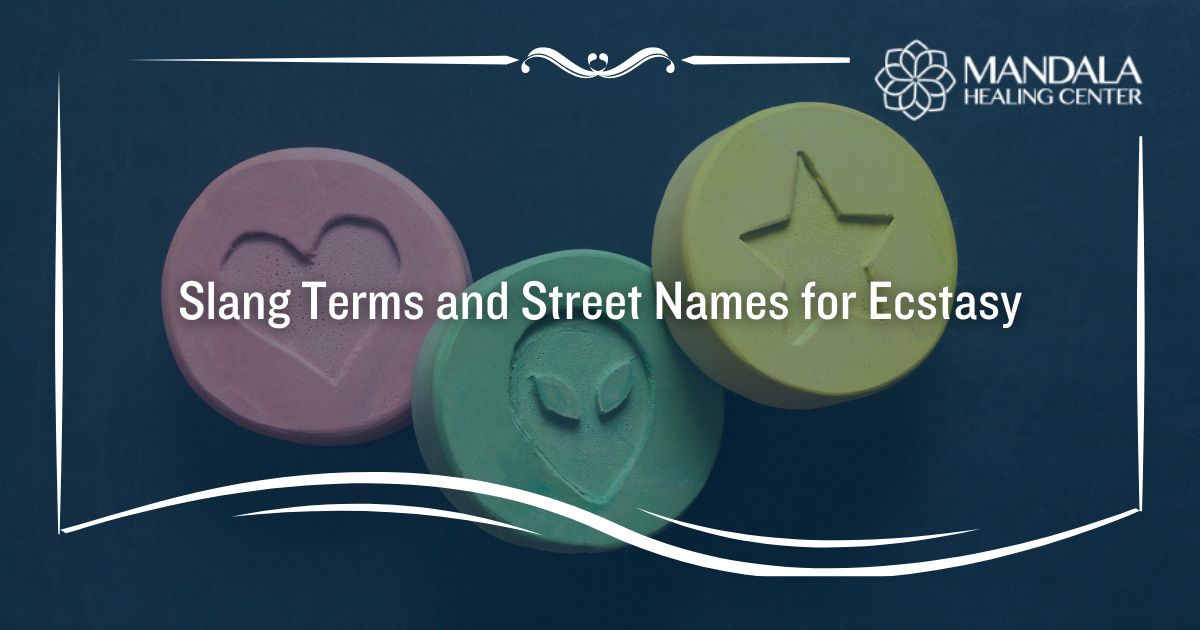MDMA, commonly known as ecstasy, is a popular recreational club drug that was first widely available in the 1980s. People take ecstasy for its pleasurable effects, which include increased energy and a sense of happiness and well-being.
Ecstasy is known by many other slang terms and street names. This article will explore many of the alternative names for ecstasy, its effects and risks, and how to recognize abuse and addiction. Contact the Mandala Healing Center staff to learn about our supportive, holistic treatment programs or to find guidance at any stage of your recovery journey.
What is Ecstasy?
Ecstasy is one of the most common names for 3,4-methylenedioxymethamphetamine (MDMA). It is an illegal synthetic drug with the properties of a stimulant and a hallucinogenic drug. The DEA classifies ecstasy as a Schedule 1 drug, meaning it has no approved medical purposes and a high risk for abuse and addiction.
Slang Terms and Street Names for Ecstasy
Ecstasy is a common street name for MDMA. Other slang terms and street names for ecstasy include:
- Molly
- Adam
- Eve
- Cadillac
- Love pill
- X
- Hug drug
- Love drug
- Clarity
- Beans
- Scooby snacks
- California sunrise
- XE
- Snowball
- XTC
- Malcolm
- Elephants
- Egg rolls
- Candy
- Skittles
- Disco biscuits
- Doves
- Smarties
- E-bomb
- Vowels
Often perceived as a purer form of ecstasy, ‘Molly’ is another term for MDMA. It’s important to note that while the term may suggest a safer option, the actual content and effects can still vary significantly.
Slang terms for using ecstasy include:
- Drop
- Double drop
- Raving
- Rolling
- Thizzing
- Flipping
These terms may suggest that ecstasy use is funny or silly, but the opposite is true. Ecstasy is a serious, potentially deadly drug. It is highly addictive and can harm your mental and physical health for a long time. Anyone who uses ecstasy must seek treatment as quickly as possible to overcome their substance use and learn how to avoid relapse.
The Effects and Risks of Ecstasy
When people take ecstasy, they typically experience stimulant and hallucinogenic effects, including:
- Increased energy
- Restlessness
- Altered sense of reality
- Changes in mood
The effects people experience depend on several factors, including:
- Age at first use
- Gender
- Dosage
- Frequency of use
- Other substances used
- Environment
Ecstasy is often contaminated by other substances, such as bath salts, caffeine, illicit drugs, cough suppressants, and more. Using contaminated MDMA can lead to unpredictable, sometimes dangerous side effects.
Using ecstasy can change how a person thinks, acts, and feels. Some of the mental, physical, and behavioral effects of ecstasy include:
- Increased heart rate
- Elevated blood pressure
- Muscle tension
- Chills
- Fainting or lightheadedness
- Nausea
- Sweating
- Lowered inhibitions
- Heightened senses
- Deeper empathy with others
- A desire for physical touch and closeness
- Increased sexual arousal
Ecstasy forces the brain to produce larger amounts of serotonin, a neurotransmitter involved in pain regulation, sleep, mood, and the perception of pleasure. Some research suggests that people who use MDMA regularly may have trouble experiencing pleasure in their daily lives or may be more likely to develop depression. They may also experience:
- Aggression
- Anxiety
- Irritability
- Memory problems
- Trouble with focus and attention
These effects are noticeable for several days after using MDMA and can linger for more than a week.
Ecstasy abuse can cause immediate damage to your health and safety. People often use MDMA in a club or party environment. Jumping, dancing, and being in a crowded space puts people at risk of hyperthermia–dangerously high body temperature–and life-threatening sodium imbalances. Overdose is relatively rare, but hyperthermia is a serious immediate risk of ecstasy use.
Some of the long-term effects of MDMA use include:
- Sexual dysfunction and low libido
- Sleep disturbances
- Impulsivity
- Depression
- Memory issues
- Heart disease
- Depression
It’s essential to understand the short and long-term risks of ecstasy and seek treatment as soon as possible.
Recognizing Ecstasy Abuse and Addiction
Substance abuse and medical experts have not determined whether ecstasy is physically addictive, but users may repeatedly use this stimulant drug and have trouble stopping on their own.
Recognizing the signs of substance abuse may help you identify the need for treatment and support sooner. Some signs of substance abuse and addiction include:
- Taking a substance in larger or more frequent doses
- Wanting to stop using the drug but finding that you can’t
- Spending a lot of time getting, using, and recovering from using the drug
- Feeling anxious about how you will get more of the drug
- Experiencing cravings for the drug
- Neglecting responsibilities at home, in school, or at work
- Giving up hobbies and activities you once enjoyed
- Isolating or spending time only with others who use drugs
- New or worsening mental health symptoms
- Legal or financial trouble resulting from substance use
- Being unable to stop using the drug, even when it causes significant harm to your emotional, social, or physical well-being
Addiction is a complete loss of control over your substance use. If you or someone in your life struggles with substance use or shows signs of addiction, don’t wait to get the help you need to recover.
Find Help Now
If you or someone in your life are one of the millions of people who struggle with substance abuse in the United States, effective, compassionate treatment is just a phone call away. Reach out to the caring specialists at the Mandala Healing Center to hear about our holistic ecstasy abuse treatment programs or to find other support during your recovery journey.












